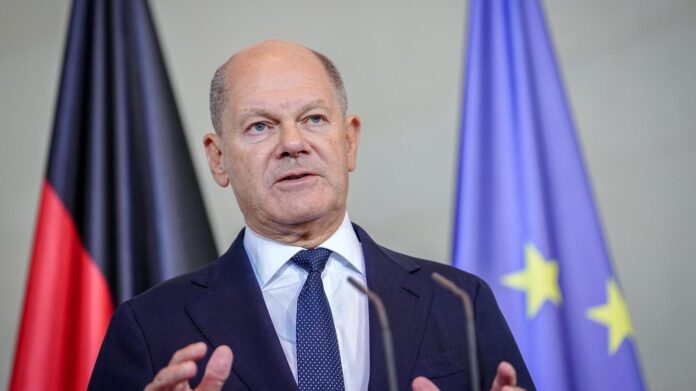
For Chancellor Olaf Scholz and his SPD, the meeting comes at the worst possible time. It is taking place far away and without German participation. In Washington, around 6,500 kilometers from Berlin, US President Joe Biden and British Prime Minister Keir Starmer will meet at 4:30 p.m. local time. They will also discuss whether Ukraine is targeting British and American long-range missiles. may attack deep within Russian territory.
It remains to be seen whether Biden and Starmer can bring themselves to do this. But the FDP and the Union are already calling on Scholz again to stop denying Ukraine the German Taurus long-range missile with a range of 500 kilometers. “Taurus must be delivered after the elections in Brandenburg at the latest,” demanded CDU defense expert Roderich Kiesewetter.
The Chancellor’s cautious message
Kiesewetter is thus addressing Scholz’s problem directly: so shortly before the Brandenburg election on 22 September, the SPD cannot afford the return of this debate from the spring. After all, Scholz, like Brandenburg’s Prime Minister Dietmar Woidke (SPD), has recently broadcast Peace signalsBecause, similar to Saxony and Thuringia, many people in Brandenburg also see the arms deliveries to Ukraine with increasing skepticism – for fear of a direct confrontation with Russia.
A fear that Russian President Vladimir Putin had already fuelled before the Washington meeting. “It is about the decision whether the NATO countries will be directly involved in a military conflict or not,” Putin said on Russian state television on Thursday.
Our red line is and remains international law.
Michael Roth (SPD), Head of the Foreign Affairs Committee of the Bundestag
How should the Chancellor react to this message? Ultimately, Scholz must avoid giving the impression that he is giving in to Putin’s threat. At the same time, the Chancellor’s negative attitude towards Taurus has not changed, as Scholz’s spokesman Steffen Hebestreit had already made clear this morning.
Scholz opted for a cryptic answer: Nothing will change in the decision “about what we do and what we don’t do,” he said after the meeting with Kenyan President William Ruto. And with a view to the Washington meeting, he added: It would be “extremely impolite” to comment in advance on talks between the heads of friendly states that have not yet taken place.
Others in the SPD decided to take a clearer stance towards Moscow. Defense Minister Boris Pistorius said of the possible move by the USA and Great Britain: “International law allows this.” However, it is always the partners’ decision to allow this. It is not his place to judge.
Michael Roth, the Social Democratic chairman of the Foreign Affairs Committee of the German Bundestag, also clearly rejected Putin’s threat: “Our red line is and remains international law. The attack on military targets on Russian territory with long-range Western weapons is in accordance with international law and does not mean NATO’s participation in the war,” he told the Tagesspiegel.
He pointed out that Putin has often set red lines, but crossing them has had no consequences. “First there were Western tanks, then attacks on Ukrainian territories annexed by Russia in violation of international law, then Western fighter planes and now it is the use of long-range weapons against military targets in Russia,” he said. These perfidious threats are part of Russia’s psychological warfare “to undermine our support for Ukraine.”
BSW feels vindicated
CDU foreign policy expert Norbert Röttgen also sees contradictions in Putin’s statements. “Putin is getting caught up in his own propaganda,” he told the Tagesspiegel. According to this, it was always a defensive war by Russia against the West, which allegedly attacked Russia with the help of the puppet regime in Kiev, said Röttgen. “Putin’s intimidating propaganda is as well-known as it is absurd,” said Röttgen.
But there are also those in the Bundestag who feel vindicated by Putin’s statements on Friday. “Releasing Western weapons for attacks on targets in Russia, including Moscow, would not be the ‘game changer’ that has been invoked once again, but an accelerant for a dangerous unleashing and expansion of the war,” Sevim Dagdelen, the foreign policy spokeswoman for the BSW group in the Bundestag, told the Tagesspiegel.
She called for a “change of course, away from constant escalation and more and more weapons, towards a ceasefire and diplomatic solutions.” By warning against escalation – also with regard to the planned stationing of American missiles in Germany – and calling for peace, the BSW is currently scoring points in the election campaign.
This is probably the main reason why Scholz recently mentioned a possible peace conference with Russia. But after Putin’s recent comments, this scenario sounds more unrealistic than ever.
